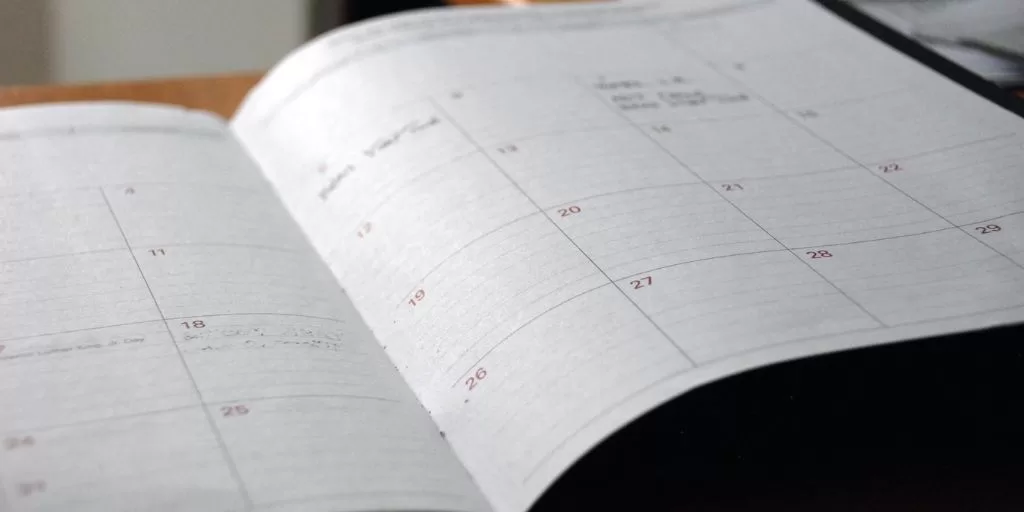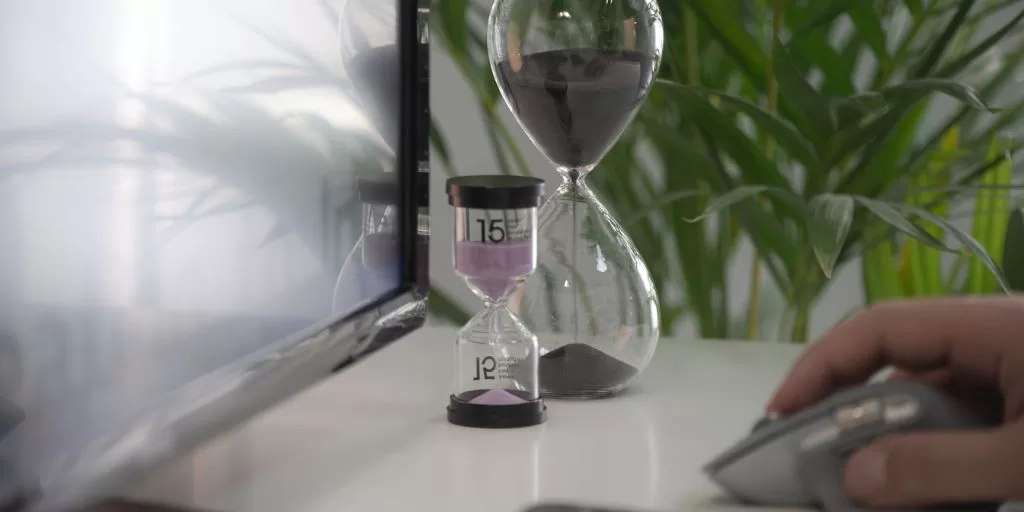Time management is a critical skill that can lead to increased productivity and improved work performance. It entails the ability to prioritize tasks, set realistic goals, and plan ahead in order to make the best use of available time. Many do not know that mental conditioning coaching can help individuals develop effective strategies for optimizing their work performance through proper time management. As a mental conditioning coach, one of my roles is to help my clients optimize their performance at work, college, or at home and developing effective time management strategies can help with that.
Time management requires an understanding of one’s own strengths and weaknesses so as to identify areas where improvement is needed. By consciously paying attention to how we spend our time, it is possible to identify patterns and habits which may be hindering optimal performance. Through mental conditioning coaching, individuals are able to assess their current state of being and adjust accordingly in order to reach maximum efficiency.
Table of Contents
Identifying Your Goals

Time management is an essential skill for any individual or organization to be successful. By effectively managing time, it can make any task easier and more efficient. To get started with time management, the first step is to identify your goals.
Goal setting is a critical part of developing a successful time management plan. It helps provide clarity on what tasks need to be completed in order to achieve desired outcomes. Goals should also be specific in nature so that progress can be easily tracked and monitored over time. Moreover, when creating goals, it’s important to consider both short-term and long-term objectives as well as practicality and feasibility.
In addition to goal setting, there are several other tips and strategies related to effective time management which include: breaking down large tasks into smaller chunks; scheduling regular breaks during work hours; prioritizing urgent tasks ahead of less important ones; delegating tasks where appropriate; using technology such as calendar apps or project management tools; and tracking results regularly in order to measure performance accurately.
For employees, managers, and leaders alike, having strong time management skills can help ensure maximum productivity while at work without sacrificing quality or accuracy. In this way, individuals will have access to the resources they need to meet their deadlines while still achieving their desired results – all while maintaining a healthy balance between personal life and professional commitments.
Establishing A Routine

Establishing a routine is an important part of developing effective time management skills. It can provide structure to our lives, ensuring that tasks are completed efficiently and on schedule. Establishing a regular routine helps us maintain focus and productivity throughout the day, while also creating a sense of balance in our personal and professional lives.
When creating a daily routine, it’s best to start by breaking down larger goals into smaller parts. This will help you establish realistic expectations for yourself regarding how much work can be accomplished each day. Additionally, incorporating mental conditioning techniques such as deep breathing exercises or positive affirmations will help keep your motivation levels high and help you stay focused on your end goal. Here are some tips to get started:
- Prioritize what needs to be done first – When creating your daily routines, make sure to prioritize activities that need immediate attention or require more energy than others. Doing this ensures that you don’t waste any valuable time trying to complete low-priority tasks before tackling those with higher importance.
- Set achievable goals – Try setting small milestones for yourself instead of one large overarching goal. Having multiple checkpoints along the way will give you something tangible to strive for and encourage you to press forward even when things seem difficult.
- Take breaks often – Taking short breaks throughout the day gives our brains a chance to rest and recharge so we can continue working at full capacity longer without becoming overwhelmed or burnt out quickly. Make sure not to overwork yourself through taking too many breaks though!
Organizing your life around these principles will lead to increased efficiency in both your personal and professional life while providing greater flexibility in managing challenging tasks ahead of schedule. The key is finding a system that works well for you; establishing healthy habits now will pay dividends later as they become second nature – enabling us all better manage our precious time today and tomorrow!
Prioritizing Your Tasks

Time management skills are essential for achieving success in any professional environment. Time management and prioritization help you focus on tasks that need to be completed first so that you can get the job done efficiently and effectively. To become an effective manager, it is important to have strong time management skills. It is also necessary to prioritize tasks in order to manage your time more effectively.
One key way to improve your time management skills is by creating a plan with specific goals and objectives that will guide you through each day’s work. This will enable you to stay organized and focused when completing tasks related to your job duties. It is also important to set realistic expectations for yourself about how much time each task should take and make sure that those expectations are met. Setting deadlines gives you a sense of urgency which can help motivate you toward meeting those goals.
When faced with multiple tasks or projects at once, it is important to break them down into smaller chunks and assign priorities accordingly. After breaking up the project into manageable pieces, create a timeline based on when certain milestones must be achieved in order to reach the ultimate goal or deadline. Prioritizing tasks allows you to focus on higher-priority items while still making progress on lower-priority items as well.
Taking regular breaks throughout the day can help keep fatigue away and increase productivity levels significantly. Breaks give us an opportunity to recharge our mental battery and come back stronger than ever before! Taking short walks, listening to music, or having conversations with colleagues can all provide benefits associated with improved concentration levels during work hours. When we practice these techniques regularly, they quickly become part of our daily routine leading us closer to attaining successful outcomes from our efforts!
Managing Your Time Effectively

Prioritizing your tasks is a crucial step in managing your time effectively. To make the most of your day, it’s important to know how to prioritize and organize your goals for maximum productivity. As a mental conditioning coach, I have identified key points that will help you develop better time management skills:
- Create an efficient system for organizing projects and tasks
- Set specific achievable goals with deadlines
- Utilize tools such as calendars and reminders to stay on track
Time management skills are essential in the workplace and can be used by employees looking to improve their performance. Making use of goal-setting and time-management techniques can give you greater control over the hours in your workday. Good time management skills involve planning ahead, using efficient methods, staying organized, and understanding when taking breaks or delegating tasks may be necessary. Developing these core principles allows you to increase focus on important tasks while efficiently completing smaller ones.
Efficient time management requires practice and dedication but with some simple exercises, anyone can learn how best to manage their schedule. Practice makes perfect so try setting aside 10-15 minutes each day dedicated solely to practicing good habits related to time management and organization. With patience, determination, and effort, you can create a steady routine that will eventually become second nature; allowing you to maximize efficiency at work without sacrificing quality or missing deadlines.
Utilizing The Right Tools

Time management is an essential skill for any successful individual. It can help us achieve our goals, increase productivity and promote work-life balance. Having good time management skills gives us control over how we use our time, enabling us to focus on higher-priority tasks and reduce stress. Fortunately, there are many solutions available that provide individuals with the opportunity to acquire these necessary skills.
Time management workshops or courses can be a great way to improve your ability to manage your time efficiently. These sessions cover topics such as goal setting, prioritizing activities, organizing projects, and improving communication strategies. The aim of these workshops is to develop effective time management skills through practical exercises and discussions with other participants. Additionally, they also offer guidance in planning and managing personal schedules more effectively.
For those unable or unwilling to attend a workshop, there are still plenty of opportunities to learn better time management habits at home or work. Many websites offer useful tips for entrepreneurs looking to optimize their workflow, while others provide resources related to activities designed specifically to improve overall time management capabilities. There are even online tools available that allow users to quickly create comprehensive plans for completing tasks within specific deadlines.
By taking advantage of the various avenues for learning about time management techniques and utilizing the right tools, individuals can make significant progress toward becoming more efficient with their efforts and unlocking greater success in their lives. With discipline, consistency, and motivation it’s possible not only to become aware of our current limitations but also to identify ways of overcoming them so that we may reach our full potential both professionally and personally.
Delegating Responsibilities

Time management is an essential skill for achieving success. One of the most important techniques to master in time management 101 is delegating responsibilities. Delegation involves assigning tasks and authority to others, allowing them to gain valuable experience and free up your own time so that you can focus on more pressing matters.
There are several benefits associated with delegating responsibilities:
- It increases efficiency by leveraging the strengths of those who have expertise or interest in certain areas;
- It allows you to use resources that may be available only through other people;
- It develops relationships between team members;
- And it boosts morale as everyone feels like they are contributing to the overall mission.
When done correctly, delegation also helps reduce stress levels and boost productivity. To successfully delegate responsibilities, it is important to identify which tasks need attention, assign duties based on individual skillsets, provide clear instructions, give appropriate deadlines, and follow up regularly. On top of that, one should avoid micro-managing while still staying informed about the progress toward the completion of assigned tasks. Practicing these strategies will help improve your time management skills significantly.
Creating an action plan for successful delegation includes setting realistic expectations and providing adequate resources needed for task completion. Establishing a timeline for each project will help ensure a timely delivery of results and allow all stakeholders involved to adjust if obstacles arise during the execution phase of the project. Examples of good time management include breaking down larger projects into smaller goals that can be easily tracked over long periods of time as well as rewarding employees when their hard work pays off in terms of increased efficiency or cost savings.
By taking advantage of this powerful tool, you can make better use of your precious time while building strong teams within your organization – both key ingredients for success!
Avoiding Procrastination

Are you a procrastinator? Are you fed up with the never-ending cycle of delaying tasks to another day, only to regret it later when deadlines come near and yet nothing has been achieved? Worry not! With simple time management skills, procrastination can be avoided with ease.
Time management is an important part of life which involves organizing and planning one’s activities in order to accomplish goals efficiently and effectively. It requires defining objectives and setting priorities while managing workloads within the allotted timeframe. To manage time successfully, students need to develop specific strategies such as creating detailed schedules or breaking down large projects into smaller achievable chunks. Poor time management often results from a lack of organization or ineffective use of available resources resulting in wasted effort leading to poor academic performance.
Good time management entails making sure that all commitments are fulfilled on time by learning how to prioritize tasks according to importance and urgency. By being mindful of how much work needs to be done, one can easily determine how long each task will take thus enabling them to create realistic timelines for completing their assignments/projects with greater efficiency. Also, some helpful ways to improve time management include using reminders, calendar applications, and other online tools like planner apps or task lists, etc., developing good study habits such as taking frequent breaks and avoiding multitasking among others; all these contribute toward becoming more productive at work/study over time.
So if you’re looking for freedom from the clutches of procrastination then start now – it may seem difficult initially but don’t give up because proper time management eventually leads you closer to achieving your desired outcome!
5 Ways To Improve Time Management Effortlessly

Time management is a crucial skill that can significantly impact your personal and professional life. When effectively harnessed, it can lead to increased productivity, reduced stress, and an overall sense of accomplishment. In this section, we’ll explore five effortless strategies that can help you improve your time management skills and achieve your goals with ease.
- Planning ahead is an effective strategy for improving time management, as it allows for more efficient use of available time;
- Prioritizing tasks is another key element for successful time management, as it allows for tackling tasks with the most importance first;
- Developing a plan of action and breaking down tasks into manageable steps can help to ensure that tasks are completed in a timely manner;
- Lastly, taking regular breaks can help to improve focus and energy levels, allowing for more efficient use of time and improved productivity;
- Integrating technology, such as utilizing productivity apps or setting reminders on your devices, can greatly enhance your time management skills by keeping you organized, accountable, and on track with your tasks and deadlines.
In essence, the art of mastering time management is a vital skill that significantly influences various aspects of our personal and professional lives. When effectively harnessed, it can lead to increased productivity, reduced stress, and an overall sense of accomplishment and satisfaction. In this section, we have explored five effortless strategies designed to help you improve your time management skills, enabling you to reach your goals more seamlessly and efficiently.
First, planning ahead is an invaluable strategy for improving time management, as it allows you to make more efficient use of the time at your disposal. By anticipating future events and deadlines, you can allocate your time and resources accordingly, ultimately enhancing your productivity.
Second, prioritizing tasks is a fundamental element of successful time management. By identifying and tackling the most important tasks first, you can focus your efforts on what truly matters, ensuring that your time is spent in the most meaningful and impactful way possible.
Third, developing a comprehensive plan of action and breaking tasks into manageable steps can contribute significantly to ensuring that tasks are completed promptly and effectively. This approach not only helps you stay on track but also boosts your motivation by providing a clear roadmap to follow.
Fourth, taking regular breaks is an essential component of time management. By stepping away from your tasks periodically, you can improve your focus and energy levels, ultimately enabling you to use your time more efficiently and enhance your overall productivity.
Lastly, the integration of technology, such as utilizing productivity apps or setting reminders on your devices, can greatly augment your time management skills. By leveraging technology to stay organized, accountable, and on track with your tasks and deadlines, you empower yourself to make the most of your time and accomplish your goals more efficiently.
Having provided an overview of these five strategies, we will now delve deeper into each step. In the following subsections, we will discuss in detail how to effectively implement these strategies in your daily life, optimizing your productivity and honing your time management capabilities.
Planning Ahead
Time management is an integral part of any successful endeavor in life, and planning ahead plays a significant role. By taking the time to consider all possibilities, we can better prepare ourselves for what lies ahead. Planning ahead helps us identify potential obstacles and come up with strategies to overcome them, as well as allows us to anticipate changes in our environment that may require adjustments to our plans. Doing so enables us to maximize our efficiency by avoiding unnecessary distractions and delays.
When it comes to time management, being proactive is key. We must actively seek out opportunities that will help optimize our performance while also preparing for challenges that could arise down the road. This includes having contingency plans in place should unexpected events occur, or making sure we are aware of upcoming deadlines that could affect the timeline of other tasks. Taking the initiative early on will not only save us precious time but also reduce stress when it comes time to execute our plan.
Developing good habits is another crucial element of effective time management. Habits allow us to perform tasks quickly and efficiently without needing conscious thought every step of the way. This can be done through mindful practice over an extended period until behaviors become ingrained into muscle memory; this way, even complex activities can be completed relatively effortlessly once mastered. Furthermore, forming good habits frees up extra mental energy which would otherwise have been spent managing mundane tasks – freeing us up to focus on more important matters instead!
By incorporating these practices into our lives, we open ourselves up to greater levels of productivity than ever before imaginable simply because we’re spending less energy worrying about things that don’t matter and instead focusing on those which do – ultimately leading toward a higher quality output from whatever venture we choose pursue. With proper planning and discipline, anyone has the capacity to reach their goals faster than they had previously dreamed possible!
Prioritizing Tasks
When it comes to improving time management, prioritizing tasks is essential for achieving our goals. It allows us to focus on the most important activities first and gives us a clear direction in which we should be heading. To effectively prioritize tasks, it is helpful to break down larger projects into smaller, more manageable chunks and then assign each one a priority level based on its importance. This way, we can easily determine how best to allocate our resources and energy toward the various components of our plan. What’s also worth mentioning is that having an organized system for tracking progress helps ensure that nothing gets overlooked or forgotten along the way. Furthermore, by taking some time every day to review what needs to be done and adjust priorities as needed, we can remain focused while still allowing ourselves flexibility when necessary. Ultimately, by making sure our efforts are directed where they will yield the highest returns, efficient time management becomes much easier!
Developing A Plan Of Action And Breaking Down Tasks Into Smaller Steps
Creating a detailed plan of action is a crucial step in improving time management, as it allows you to approach tasks methodically and efficiently. By breaking tasks down into manageable steps, you can significantly enhance your ability to complete them in a timely manner while maintaining motivation and reducing stress. This section will discuss the process of developing a plan of action and breaking down tasks into smaller components, as well as provide practical examples and tips to ensure your success.
- Identify the Goal
The first step in developing a plan of action is to clearly define your goal or the desired outcome of the task. This not only provides a clear direction for your efforts but also helps you maintain focus and motivation throughout the process.
- Analyze the Task
Once you have identified your goal, the next step is to analyze the task at hand. Consider the steps required to achieve the goal, the resources needed, and any potential obstacles or challenges that you may face. This analysis will provide you with valuable insights that can inform your plan of action and help you navigate any issues that may arise.
- Break Down the Task into Smaller Components
After analyzing the task, break it down into smaller, more manageable components. These smaller steps should be actionable, specific, and achievable within a reasonable timeframe. Breaking the task down into smaller components not only helps you maintain focus and motivation but also allows you to track your progress more easily.
- Assign Time Estimates and Deadlines
Once you have broken down the task into smaller components, assign time estimates and deadlines for each step. This will help you stay on track and ensure that you are making steady progress toward your goal. Be realistic in your time estimates and allow for flexibility, as unforeseen circumstances or challenges may arise.
- Organize the Steps Logically
Organize the smaller components of the task in a logical order, taking into consideration any dependencies or prerequisites that may exist. This will help you create a smooth workflow and ensure that each step is completed in the most efficient manner possible.
- Monitor and Adjust
As you work through your plan of action, it is essential to monitor your progress and adjust your plan as necessary. If you encounter obstacles or challenges, reassess your approach and modify your plan to overcome these issues. By continually evaluating and adjusting your plan of action, you can ensure that your time is being used effectively and that you are making steady progress toward your goal.
- Celebrate Your Success
Upon completing each step or achieving a significant milestone, take a moment to celebrate your success. Acknowledging your accomplishments can help boost your motivation and maintain your momentum as you work toward your goal.
By developing a plan of action and breaking down tasks into manageable steps, you can significantly improve your time management skills and ensure that tasks are completed efficiently and effectively. This methodical approach not only helps you maintain focus and motivation but also enables you to overcome challenges and achieve your goals in a timely manner.
Taking Regular Breaks: The Power of the Pomodoro Technique
The importance of taking regular breaks to maintain focus and energy levels cannot be overstated. In the context of time management, breaks can help prevent mental fatigue, improve productivity, and ultimately lead to more efficient use of time. One popular and effective method for incorporating breaks into your work routine is the Pomodoro Technique, a time management system that breaks work into short intervals separated by brief breaks. This section will delve into the Pomodoro Technique and its benefits, as well as provide guidance on implementing this approach in your daily life.
The Pomodoro Technique: An Overview
The Pomodoro Technique, developed by Francesco Cirillo in the late 1980s, involves breaking work into 25-minute intervals, called “Pomodoros,” followed by a 5-minute break. After completing four Pomodoros, a longer break of 15 to 30 minutes is taken. This technique allows you to maintain focus and energy levels throughout the day, improving overall productivity.
Benefits of the Pomodoro Technique
- Increased Focus: The short, focused intervals of work help to maintain concentration and prevent distractions from derailing your progress.
- Reduced Mental Fatigue: Regular breaks allow your mind to recharge, ensuring that you can sustain high levels of productivity throughout the day.
- Improved Task Management: The Pomodoro Technique encourages breaking tasks into smaller components, which can help you manage your time more effectively.
- Greater Sense of Accomplishment: By completing multiple Pomodoros, you can track your progress and gain a sense of achievement as you move through your tasks.
- Enhanced Work-Life Balance: The structured breaks provide opportunities to attend to personal needs, fostering a healthier work-life balance.
Implementing the Pomodoro Technique
- Choose a Task: Select a task or project that requires your focus and attention.
- Set a Timer: Set a timer for 25 minutes, committing to work on the task for the duration of the Pomodoro.
- Work on the Task: Work on the task until the timer goes off, avoiding distractions and maintaining focus.
- Take a Short Break: After the timer goes off, take a 5-minute break to relax and recharge.
- Repeat and Take a Longer Break: Continue the process, completing four Pomodoros before taking a longer break of 15 to 30 minutes.
By taking regular breaks and implementing the Pomodoro Technique, you can significantly improve your focus, energy levels, and overall productivity. This approach to time management not only helps you use your time more efficiently but also supports a healthier work-life balance and reduces mental fatigue.
Leveraging Technology for Time Management: Productivity Apps and Reminders
In today’s digital age, integrating technology into your time management strategies can be a game-changer. By using productivity apps and setting reminders on your devices, you can stay organized, hold yourself accountable, and remain on track with your tasks and deadlines. This section will explore various productivity apps and how to effectively use reminders to support your time management goals.
Productivity Apps: Enhancing Time Management and Organization
There is a wide range of productivity apps available that can help streamline your time management efforts. These apps often include features such as to-do lists, project management tools, and time-tracking functions. Some popular productivity apps that you may find helpful include:
- Trello: A visual project management app that uses boards, lists, and cards to organize tasks and collaborate with team members.
- Todoist: A to-do list app that helps you organize tasks, set priorities, and track progress.
- Asana: A comprehensive project management tool that allows you to plan and track tasks, collaborate with team members, and set deadlines.
- RescueTime: An app that tracks how you spend your time on your devices, providing insights into your habits and helping you make better use of your time.
- Evernote: A note-taking app that allows you to capture ideas, create to-do lists, and organize information across multiple devices.
Reminders: Staying Accountable and On Track
Setting reminders on your devices is another valuable way to harness technology for improved time management. By using calendar apps, reminder apps, or even the built-in reminder functions on your smartphone, you can:
- Ensure you don’t forget important tasks or deadlines by setting alerts.
- Schedule regular check-ins to assess your progress and make adjustments to your plan as needed.
- Break down larger tasks into smaller, actionable steps with accompanying reminders to help you stay focused and on track.
- Set motivational reminders or positive affirmations to help maintain your momentum and productivity throughout the day.
- Coordinate and synchronize reminders across multiple devices to ensure you stay informed and organized, regardless of which device you’re using.
By integrating technology into your time management strategies, you can greatly enhance your ability to stay organized, accountable, and on track with your tasks and deadlines. Utilizing productivity apps and setting reminders on your devices are powerful tools that can support your efforts and help you achieve your goals more efficiently.
Key Takeaway

Time management requires discipline and focus, but with the right strategies in place, it can be achieved. Visualize yourself achieving your goals like a champion athlete crossing the finish line of a marathon; whatever you set out to do, you will accomplish! It is crucial to identify your objectives, prioritize tasks, and make use of available resources. Utilizing techniques such as delegating responsibilities or avoiding procrastination are also key components of successful time management that should not be overlooked. Ultimately, taking consistent action toward these practices will lead to increased productivity without sacrificing health or happiness.




